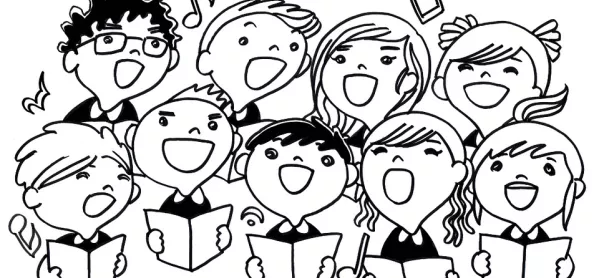I spent yesterday evening watching my daughter sing in a concert. I say “watched”, but there were several acres and approximately 15,000 people between us. Even with binoculars, she was an interchangeable dot in a white T-shirt half hidden behind a lighting rig.
It was a Young Voices concert and, unbeknown to be me, a well-established annual event. Someone (I’m afraid I don’t know who, but I applaud them all the same) came up with the idea of combining hundreds of primary school choirs to form one superchoir that would perform to capacity crowds in huge stadiums normally reserved for A-list rock and pop stars. To add to the starry ambiance, they throw in jazzy lighting, a professional conductor and band and some celebrity performers. Tony Hadley was leading the charge last night (impressive, even if he did deny us Gold).
There’s something about children singing together that gets to you like nothing else. The older I get, the more it affects me. Primary teaching in the current climate may be a tough gig but walking into the hall and hearing a whole school sing never fails to give me a lift. When I hear over 6,000 of them doing it in a stadium, it’s all I can do not to weep with joy.
But while the stadium event is an amazing opportunity, singing doesn’t have to be on that kind of scale. It should just be a daily part of school life. I think in many primary schools it is: children sing together in assembly, in class, in singing practice and music lessons. But there are schools where some children go days without singing: where they miss singing sessions to attend intervention groups, where assemblies are music-free zones and singing is confined to Christmas and school productions.
I don’t trust schools that don’t sing regularly and I’d never want to work in one. It wouldn’t matter how great their academic achievements - they are actively choosing to be the von Trapp family before Julie Andrews came along and, quite frankly, no one should live that way.
Regular collective singing in school is a no-brainer. For a start, it’s cheap. In these lean days of budget cuts where the notion of instrumental tuition for all is a vanquished dream, singing is affordable. It requires nothing more than a backing track, a screen full of lyrics and some decent behaviour management.
Secondly, it’s easy on teacher workload. There’s little planning and differentiation and you can’t really mark it. At risk of upsetting proper music teachers, I’d argue you don’t need much in the way of musical talent to get going. I’m a lousy singer but I’ve run school choirs and taken loads of hymn practices, mostly by picking out the melody one-handed on the piano and getting children to sing it back. There’s also a wealth of online help out there if teaching music is not your specialist area.
Does it turn every child into an angel? Of course not, but don’t underestimate the influence it can have on behaviour. I’ve seen it boost confidence in the shy, spark interest in the disaffected and generally de-stress across the board. If singing isn’t hardwired in children, why do we hear it in the playground? Why do I come across children humming to themselves as they work and why do my own kids sing their school production songs until I want to cut my ears off?
Put simply, nothing will make your school feel like a community as quickly as whole school singing. For such a simple act, it’s incredibly powerful in a way that transcends things like data and tests and Ofsted and all the other inescapable aspects of 21st-century education.
As Tony Hadley didn’t tell me yesterday, “Always believe in your soul/You’ve got the power to know/You’re indestructible”.
Pure gold.
Jo Brighouse is a pseudonym for a primary teacher in the West Midlands. She tweets @jo_brighouse





